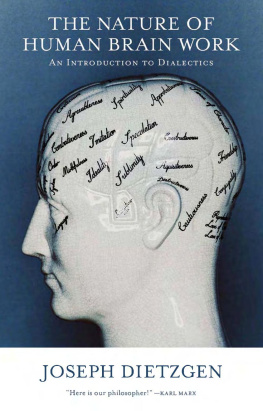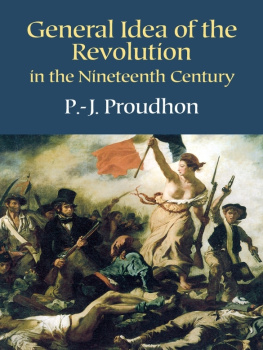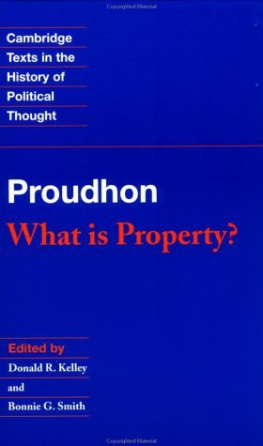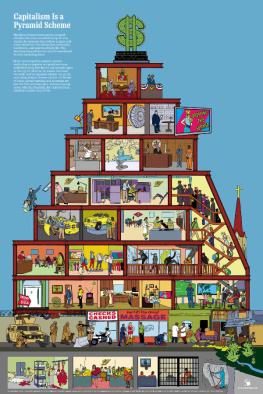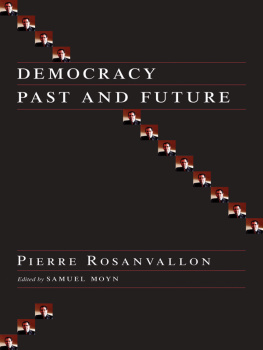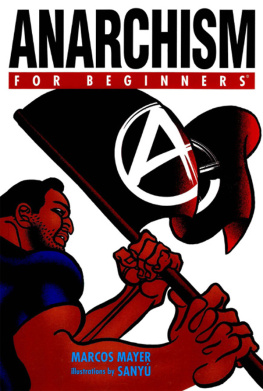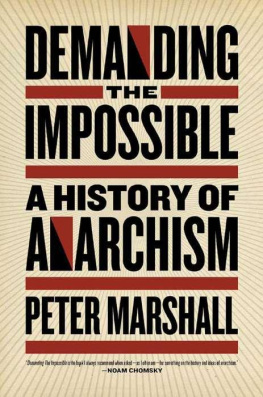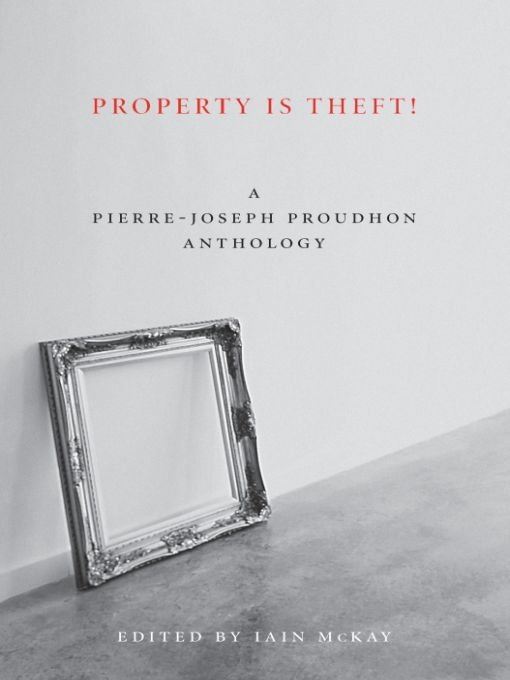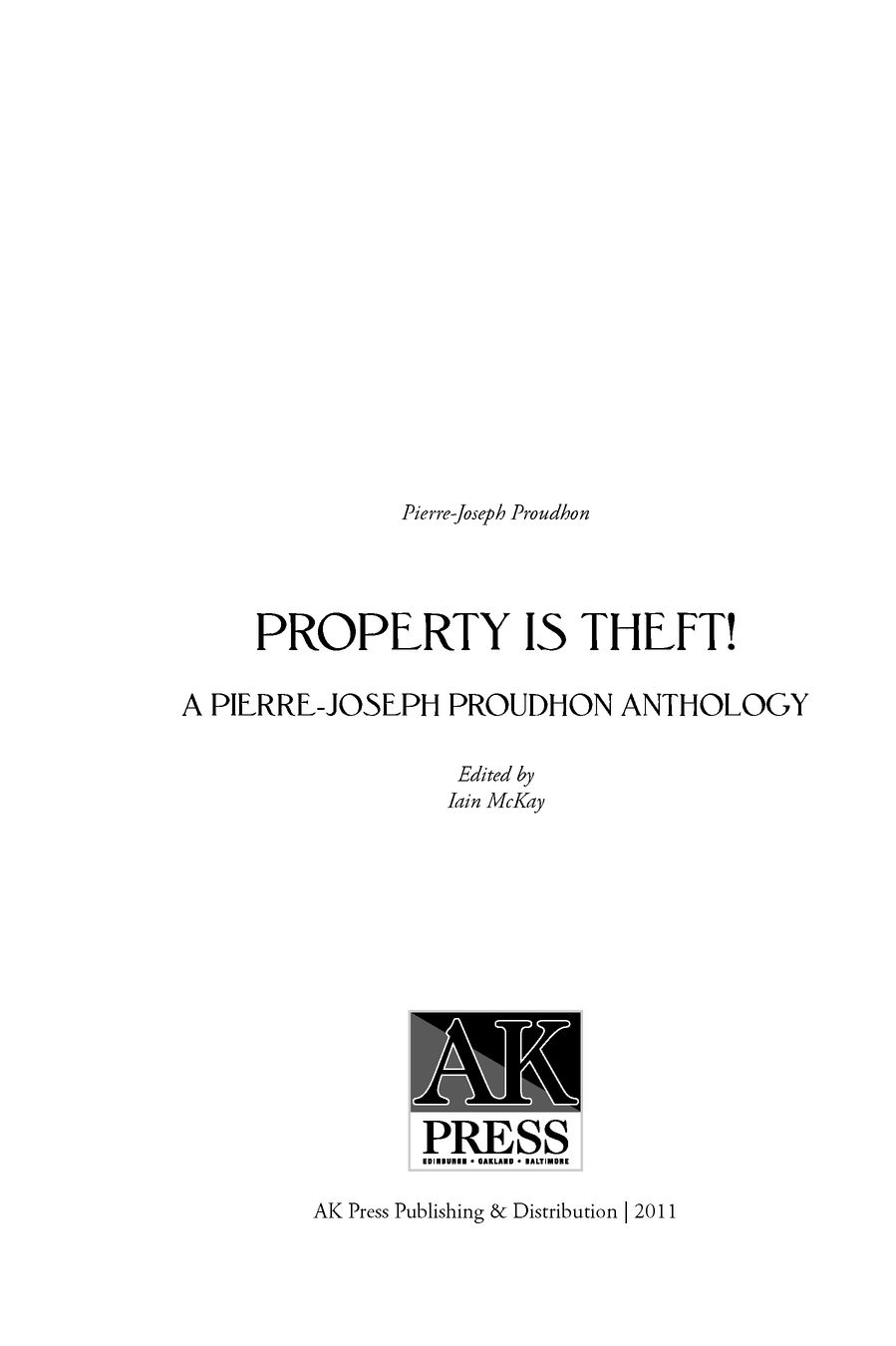Table of Contents
Advance Praise for Property Is Theft!
Iain McKay has done a superb job collecting Proudhons most important, provocative and influential writings in one volume, many of which have not previously appeared in English. This collection will become an indispensable source book for anyone interested in Proudhons ideas and the origins of the socialist and anarchist movements in 19th century Europe.
Robert Graham, editor of Anarchism: A Documentary History of Libertarian Ideas, Vols 13
Even Proudhons harshest critics, including Marx, agreed that his passion for liberty and equality was inspiring, and its time to re-evaluate his substantive work. This reader is the ideal place to begin. Iain McKays introduction offers a sure-footed guide through the misconceptions surrounding Proudhons thought, and the rich collection spans his years as an activist and theorist. Unlike much of the polemical argument around Proudhon, this volume will open up debate, rather than shut it down; it will let readers make up their own minds about the father of anarchism.
Mark Leier, author of Bakunin: The Creative Passion

Pierre-Joseph Proudhon was a hugely influential figure in French working-class history and in the history of the French Left, as well as being widely acknowledged as the father of anarchy, as Kropotkin once put it. Yet the precise nature of his political thought, his relation to anarchism as it came to be understood after his death and the value of his contribution have been the focus of much (often acrimonious) debate. He has over the years been accused of being eclectic, inconsistent, self-contradictory and reactionarynot to mention the reductionist Marxist criticism of being a petit bourgeois. A number of scholars in recent years have arguedas does Iain McKay in his introduction to this volumethat much of what has been said about Proudhon has been based on ignorance and received ideas, as well as questionable methodological approaches, and they have proposed a re-evaluation of his ideas. However, one of the problems hitherto for those wishing to return to the sources to see for themselves what Proudhon actually wrote has been the lack of English translations of most of his works. This anthology of Proudhons writings, the most comprehensive yet published, is therefore extremely welcome and an important addition to the growing literature on Proudhon, and will hopefully make possible a more rigorous and fruitful engagement with this important figure.
David Berry, author of A History of the French Anarchist Movement 19171945
Publisher, political prisoner, political economist, and (briefly) parliamentarian, Proudhon was a pillar of nineteenth century socialism. His insights into economic and political issues led the young Karl Marx to call him the most consistent and wisest of socialist writers. His libertarian vision of an egalitarian society based on self-management and federalism deeply influenced Mikhail Bakunin, founder of anarchism, who called him the master of us all. Today, Proudhons strategy for changethe creation of an alternative economy, created from below, through co-operativesinfluences movements across the world. Yet his enduring influence and importance has been shrouded by caricature and his works remain difficult to obtain. This remarkable collection thus makes a vital contribution to the task of left and labour renewal in the post-Soviet world. Iain McKay has provided, at last, the definitive English-language collection of the masters masterworks, framed by a powerful introduction and insightful notes.
Lucien van der Walt, co-author of Black Flame: The Revolutionary Class Politics of Anarchism and Syndicalism
In the English-speaking world, Proudhon is one of the best known but least well understood anarchists, largely because the bulk of his work is not available in translation. Iain McKays comprehensive anthology, which draws on Proudhons correspondence as well as his published work, fills a real gap and should encourage new readers to engage with his work and appreciate both the positive contribution he has made to anarchist thinking and the enormity of his influence on the anarchist movement.
Ruth Kinna, author of Anarchism: A Beginners Guide and editor of Anarchist Studies
From Iain McKay, principal author of the standard anarchist educational resource An Anarchist FAQ, comes Property is Theft! A Pierre-Joseph Proudhon Anthology. Besides replacing Stewart Edwardss Selected Writings as the definitive Proudhon reader after several decades, it is clearly superior to Edwardss collection. First, instead of Edwardss unsatisfactory approach of compiling snippets of text under subject headings in a sort of Bartletts quotations format, McKays anthology provides complete digests of Proudhons texts with important passages in unbroken form. Second, this collection includes a wide variety of new texts, many of them translated especially for the present effort. This new anthology may well serve as the definitive reference source for as long as Selected Writings did. This should be cause for excitement and eager anticipation among Proudhon enthusiasts everywhere.
Kevin Carson, author of Studies in Mutualist Political Economy
I dedicate this book to my daughters.
May it show the importance of being bilingual!
INTRODUCTION
GENERAL IDEA OF THE REVOLUTION IN THE 21ST CENTURY
But then came Proudhon: the son of a peasant, and, by his works and instinct,a hundred times more revolutionary than all the doctrinaire and bourgeoisSocialists, he equipped himself with a critical point of view, as ruthless as it wasprofound and penetrating, in order to destroy all their systems. Opposing libertyto authority, he boldly proclaimed himself an Anarchist by way of setting forthhis ideas in contradistinction to those of the State Socialists.
Michael Bakunin
IN 1840, TWO SHORT EXPRESSIONS, A MERE SEVEN WORDS, TRANSFORMED socialist politics forever. One, only four words long, put a name to a tendency within the working class movement: I am an Anarchist. The other, only three words long, presented a critique and a protest against inequality which still rings: Property is Theft!
Their author, Pierre-Joseph Proudhon (18091865), was a self-educated son of a peasant family and his work, What Is Property?, ensured he became one of the leading socialist thinkers of the nineteenth century. From his works and activity, the libertarian movement was born: that form of socialism based on the denial of Government and of Property. It would be no exaggeration to state that if you do not consider property as theft and despotism and oppose it along with the state then you are not a libertarian. As George Woodcock summarised:



